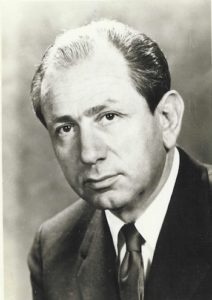
Joachim Prinz
*Joachim Prinz was born on this date in 1902. He was a white Jewish-American Rabbi outspoken against Nazism and an activist for the American Civil Rights movement.
Prinz was born to a Jewish family in the village of Bierdzany (near Oppeln) in the Prussian province of Silesia. Early on, he became motivated and took an increasing interest in Judaism. His Jewish roots grew even stronger following his mother’s death. By 1917, he joined Blau Weiss, the Zionist youth movement. At 21, Prinz received his Ph.D. in philosophy and minored in Art History at the University of Giessen. He was ordained as a rabbi at the Jewish Theological Seminary in Breslau. He married Lucie Horovitz, who died in Berlin shortly after giving birth to their daughter Lucie. Prinz then married Hilde Goldschmidt in 1932. They had three children, Michael (born in Berlin), Jonathan, and Deborah (born in the United States). Prinz was already familiar with anti-Semitism in society.
He could see Hitler’s message as a rallying cry that was capturing the hearts of the country. He started persuading Jews to leave Germany to save their lives. This message made him a constant Gestapo target. He was often arrested and detained on harassment charges by the Gestapo. As his prominence grew in Germany and his fears of Hitler's reign came to fruition, he earned the sponsorship of Rabbi Stephen Wise, a close adviser to President Franklin Roosevelt. In 1937, Prinz immigrated to the United States. He settled in New Jersey as the spiritual leader of Temple B'Nai Abraham in Newark. He immediately began lecturing throughout the U.S. for the United Palestine Appeal, established in the 1920s as the fundraising arm in the United States for the Jewish Agency for Israel. It was, essentially, the precursor to what became the American Jewish support base for the nation-state of Israel and the United Israel Appeal.
From his early days in Newark, a city with a very large minority community, he spoke from his pulpit about the disgrace of discrimination. He joined the picket lines across America, protesting racial prejudice from unequal employment to segregated schools, housing, and all other areas of life. While serving as President of the American Jewish Congress, he represented the Jewish community as an organizer of August 28, 1963, March on Washington. He came to the podium immediately following a stirring spiritual sung by Mahalia Jackson and just before Martin Luther King, Jr. delivered his famous "I Have a Dream" speech. Dr. Prinz's address is remembered for its contention that, based on his experience as a rabbi in Nazi Germany after the rise of Hitler, in the face of discrimination, "the most urgent, the most disgraceful, the most shameful and the most tragic problem is silence."
Dr. Prinz devoted much of his life to the Civil Rights movement in the United States. Joachim Prinz died on September 30, 1988.